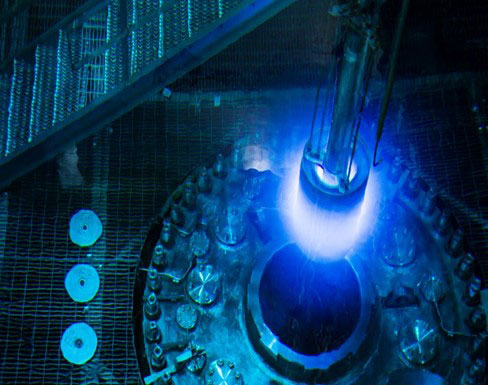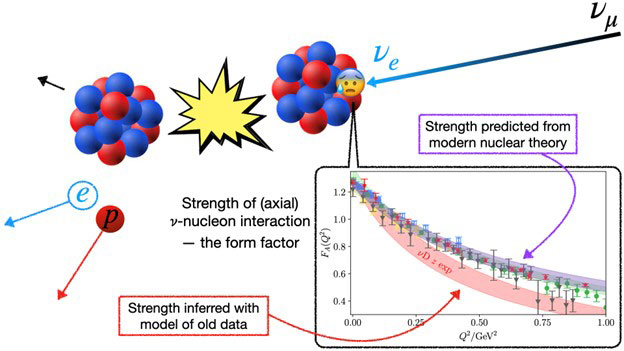Review Policy / Proposal Guidelines / Reporting Requirements
Peer Merit / Review Policies
Review and Selection of Research Projects
All research projects supported by the Office of High Energy Physics (HEP) undergo regular peer review* and merit evaluation based on procedures set down in 10 CFR Part 605 for the extramural grant program and in an analogous process for the laboratory programs and scientific user facilities. The purpose of peer reviewing HEP research projects is to provide HEP program managers with independent technical evaluations. The HEP peer review process evaluates the following criteria, in order of importance:
- Scientific and/or technical merit or the educational benefits of the project;
- Appropriateness of the proposed method or approach;
- Competency of applicant's personnel and adequacy of proposed resources; and
- Reasonableness and appropriateness of the proposed budget.
The criteria for a review may also include other appropriate factors established and announced by the Office of High Energy Physics.
The HEP peer review and merit evaluation procedures are described within the following documents:
For more information about SC's merit review system, please browse the Grants and Contracts website.
Conflict of Interest
If you have any affiliation with, or any personal or financial connection to, the person or institution submitting this research proposal that might be construed as creating a conflict of interest, please contact the Department of Energy (DOE) Program Manager before proceeding further with your review. The general standard for judging whether a conflict of interest situation exists is whether a reasonable person with knowledge of all the relevant facts would have reason to question your impartiality in the matter. If you know that you have a conflict of interest, please advise us and destroy the research proposal and any information leading to it promptly. We assume that you have no conflict of interest if you proceed with the review. Do not contact the principal investigator concerning any aspect of the proposal. Upon completion of the review, please destroy any copies of the research proposal you may have made.
Confidentiality of Research Proposals and Peer Reviews
The Department receives research proposals in confidence and is responsible for protecting the confidentiality of their contents. For this reason, please do not copy, quote, or otherwise cite material from this research proposal. Use the information in the research proposal for review purposes only, and treat the information in confidence except to the extent that some portions of it may already be available to the general public without restriction. It is the policy of the Department that reviews will not be disclosed to persons outside the Government except when an external review team (e.g., a Committee of Visitors) accesses Department files in the course of performing an evaluation of a program area within the Department. In these instances, each member of such an external review committee signs a conflict-of-interest statement before the review is conducted. In addition, the Department may send verbatim excerpts or abstracts of the reviews without the names and affiliations of the reviewers to the principal investigator. The Department considers reviews to be exempt from disclosure under the Freedom of Information Act (FOIA, 5 USC 552) but cannot guarantee that it will not be forced to release reviews under FOIA or other laws.
HEP Proposal Guidelines
It is important that the specific proposals be submitted to the proper funding opportunity announcement. Failure to do so may result is in a proposal declined with no review. Please read the following carefully.
HEP’s Comparative Review
Each year, the Office of High Energy Physics (HEP) issues The Research Opportunities in High Energy Physics funding opportunity announcement (FOA). Research proposals submitted in response to this FOA are merit reviewed on a comparative basis that started in fiscal year 2012. Proposals submitted to this FOA are only accepted during the limited time when the solicitation is open.
Restrictions as to what sort of institutions can submit proposals do apply; a careful reading of the FOA is warranted.
This FOA is HEP’s principle research funding instrument. Other FOAs that support HEP activities in very specific areas are offered during the course of the year, often open for a limited time. For more information and to access to the current or most recent Comparative Review FOA, please go to the HEP Funding Opportunities web page.
Office of Science Annual Solicitation
The Continuation of Solicitation for the Office of Science Financial Assistance Program is the Office of Science’s annual solicitation. Proposals may be submitted to this FOA year round.
It is strongly recommended that proposals addressing specific HEP research or technology development activities that were formerly submitted to the Office of Science annual solicitation be now submitted to HEP's Research Opportunities in High Energy Physics FOA.
For a complete description of the types of Office of Science funding opportunity announcements, corresponding guidelines and requirements, and how to apply for a financial assistance award, please view the Office of Science’s Funding Opportunities web page.
Supplemental and Conference proposals
Supplemental proposals that seek financial support to an existing grant funded under the Research Opportunities in High Energy Physics FOA should be submitted to the Office of Science’s annual solicitation, as previously done. Conference proposals should also be submitted to the annual solicitation.
Conference proposal guidelines
Proposals/FWPs must be submitted AT LEAST 6 MONTHS prior to the start of the conference to allow for proper review and processing of proposals. Proposals not meeting this requirement may be declined without further review.
Please note the following:
- Funding from HEP is usually limited to $10k per conference and $5k for a workshop. Exceptions may be made for special cases.
- Costs for entertainment and alcoholic beverages are not allowed and cannot be reimbursed. Such costs cannot be included in the conference registration fee.
- Costs for meals, refreshments (e.g. coffee breaks), invited speaker travel or honoraria are allowable only in very limited circumstances. Explicit justification must be provided.
- Costs for room and A/V rental, meeting support, and conference proceedings are allowable.
- Travel support should be limited to students who have no other source of funding.
- Grantees are not allowed to charge overhead on conference proposals.
- Exploring multiple funding sources is encouraged and should be noted in the proposal.
- Conferences held outside the US are generally not supported, even if organized by US groups. Exceptions may be made in rare circumstances for international conferences or workshops where funding through a US lab is the only viable alternative and there is a demonstrated programmatic interest to the DOE.
- Conference and/or workshop related applications submitted to DOE Office of Science program offices have additional requirements regarding 1) the current code of conduct of the host organization for the meeting and 2) a recruitment and accessibility plan for speakers and attendees. Further guidance on these requirements are provided at: https://science.osti.gov/grants/Applicant-and-Awardee-Resources/Conference-Proposals.
HEP Reporting Requirements
Progress Reports
DO NOT include any personally identifiable information (e.g. birth dates, SSN #s) in your report. Reports may be included in publically searchable databases and we cannot ensure confidentiality of information provided.
Grants, cooperative agreements, and interagency agreements:
On or about October 1, 2015, Progress Reports will be collected in the DOE Office of Science Portfolio Analysis and Management System (PAMS). If you are a Principal Investigator (PI) on a grant, cooperative agreement, or an interagency agreement, then after that date, all annual Progress Reports must be submitted through PAMS.
As before, Progress Reports are due in PAMS ninety (90) days before the end of each budget period. Thirty (30) days prior to the Progress Report due date, PAMS will send the PI an email requesting a Progress Report. The PI subsequently should complete the task in PAMS to submit the report. The DOE Program Manager for the grant, cooperative agreement, or interagency agreements may approve, request changes, or disapprove the report. If a revised budget is required for the next budget period, the DOE Program Manager will initiate a request to the PI and/or the institution’s Sponsored Research Office when approving the Progress Report.
PAMS will follow the format detailed in the federal-wide standard Research Performance Progress Report or RPPR. Please refer to this site for guidelines on the content and supporting material required for the Progress Report.
If you have trouble using PAMS, consult the “External User Guide” on the PAMS website or contact the PAMS Helpdesk at PAMS-Helpdesk@science.doe.gov.
Laboratory Field Work Proposals (FWP):
PIs at national laboratories (for example, a PI of a laboratory Early Career Award) will continue to submit their progress reports as they have done in the past until further notice.
All PIs must follow the same format as detailed in the federal-wide standard Research Performance Progress Report or RPPR.
Progress reports should be emailed directly to SC.HEPProgressReports@science.doe.gov
Final Reports
DO NOT include any personally identifiable information (e.g. birth dates, SSN #s) in your report. Reports may be included in publically searchable databases and we cannot ensure confidentiality of information provided.
A Final Report that summarizes the entire project must be submitted by the recipient within ninety (90) days after the final project period ends or the award is terminated. Satisfactory completion of an award will be contingent upon the receipt of this report. The Final Report shall follow the same outline as a progress report. A list of manuscripts prepared for publication should be appended. Submit one copy of the Final Report to the DOE Project Officer (Block 11 of the Notice of Financial Assistance Award). The final Scientific/Technical Report must be submitted electronically-via the DOE Energy Link System (E-Link) accessed at http://www.osti.gov/elink-2413.
The report must be accompanied by a completed electronic version of DOE Form 241.3, "U.S. Department of Energy (DOE), Announcement of Scientific and Technical Information (STI)." You can complete, upload, and submit the DOE F.241.3 online via E-Link.
Reports must be submitted in the ADOBE PORTABLE DOCUMENT FORMAT (PDF) and be one integrated PDF file that contains all text, tables, diagrams, photographs, schematic, graphs, and charts. Materials, such as prints, videos, and books, that are essential to the report but cannot be submitted electronically, should be sent to the Contracting Officer at the address listed in Block 12 of the Notice of Financial Assistance Award.
Please note the following:
Your report becomes the public record of the taxpayer-funded research.
- You are responsible for uploading the report to ELink. As a courtesy, you should send an electronic version to your Grant Monitor.
- Your final closeout report should cover your research conducted during your last renewal period. Many HEP grants have been renewed multiple times, but only the last renewal period, typically three years, needs to be covered.
- Your final report should emphasize the last budget year and include important results and highlights from your last renewal period. Consider using the progress report format and limit the length to no more than five pages per Principle Investigator.
- Include a list of those students partially or fully supported by your grant who were awarded a PhD during your final renewal period.
- Do not include budget sheets or estimates of unexpended funds.
Final Reports must be submitted within 90 days after the final project period ends.



